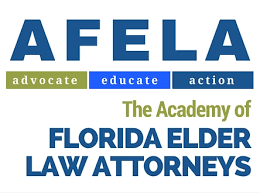Strategic Initiatives for Academy of Florida Elder Law Attorneys
AFELA, the Academy of Florida Elder Law Attorneys, held its annual strategic planning retreat in St. Petersburg in May 2018. The non-profit organization is the pre-eminent organization of Florida elder law attorneys providing advocacy, education, and action on behalf of seniors and adults with disabilities.
 Shannon Miller was selected to participate in the 2-day event that reviewed successes in 2017 and set goals for the upcoming year to address the most significant issues facing our seniors and those with special needs. The event began with a focused session followed by a team building zip line activity (who says strategic planning can’t be fun?) and progressed to problem solving and planning action steps for strategic goals.
Shannon Miller was selected to participate in the 2-day event that reviewed successes in 2017 and set goals for the upcoming year to address the most significant issues facing our seniors and those with special needs. The event began with a focused session followed by a team building zip line activity (who says strategic planning can’t be fun?) and progressed to problem solving and planning action steps for strategic goals.
As a result of this intensive study, the team determined that the most important strategy for 2018-19 is the need for more successful advocacy at the legislative level to further advocate for seniors and their unmet legal needs. Although the attorneys of AFELA offer an extensive amount of consumer education across the state and in the legislature, more visibility would also elevate our influence and success at proposing additional legislation and solutions to the issues affecting seniors and special needs adults.
2018-19 Elder Law Initiatives
Asset Freeze Legislation
The new exploitation legislation allowing asset freeze was signed by Governor Scott in April 2018. The next step is to train all stakeholders involved in protecting seniors from financial exploitation to implement law and process. These stakeholders include attorneys, bankers, judges, clerks, and financial advisors. As a review, the new legislation offers a quick, inexpensive mechanism for the temporary freezing of assets to prevent exploiters from emptying the bank accounts of our most vulnerable citizens. Read more.
Expanding the Slayer Rule in Florida
As elder abuse is on the rise, the advocates have realized that something more needs to be done to combat exploitation. There are currently eight states that have expanded their Slayer Rule statutes to include perpetrators of elder abuse. Just like the original Slayer Rule disinherits the heir or beneficiary who has killed the decedent, the elder abuse Slayer Rule disinherits the heir or beneficiary who has abused the decedent, including financially. The public policy behind expanding the Slayer Rule is to prevent perpetrators of elder abuse from profiting from their wrongdoing. Family members are usually the perpetrators of elder abuse and the expansion of the Slayer Rule will work effectively to penalize abusers.
The expansion is necessary because often family members will exploit their loved ones, then inherit on the same level as other non-exploiting family members. Some perpetrators are motivated to commit financial abuse in order to purposefully modify the victim’s estate plan. Others purposefully engage in abuse in order to speed up the victim’s death so they can inherit. As the Slayer Rule is applied to cases of elder abuse, the wrongdoer is accordingly punished, and sometimes excluded as a beneficiary under the estate plan of the victim.
AFELA hopes to model its new proposed legislation targeting elder abusers after its original Slayer Rule Statute as follows: Abuser not entitled to receive property or other benefits by reason of victim’s death. Ellen Morris, elder law attorney in Miami and recipient of the 2017-18 Charlotte Brayer Award, is the chair of the litigation committee who is drafting this legislation along with her comittee, which includes Shannon Miller. Natasa Gilsic (2017) “Expanding the Slayer Rule in Florida: Why Elder Abuse Should Trigger Disinheritance,” Barry Law Review: Vol. 22: Iss. 1, Article 6. Available at: http://lawpublications.barry.edu/barrylrev/vol22/iss1/6debbd
Electronic Will Legislation
Last year, Governor Rick Scott vetoed a controversial bill that would create the “Florida Electronic Wills Act.” If passed, this bill would have allowed wills to be signed, witnessed and notarized remotely through audiovisual technology and would have permitted electronic wills of residents and non-residents to be probated in the State of Florida.
With the State of Florida having the highest percentage of residents 65 or older, safeguards against fraud, forgery, and undue influence in the estate planning process are essential. The governor found that the bill failed to provide the proper protections for vulnerable citizens.
This year, AFELA will be drafting our own electronic will legislation that will provide safeguards to remote notarization that will protect seniors and give them access to estate planning if they simply cannot execute documents in person. Shannon Miller looks forward to being able to provide this service as part of The Miller Elder Law Firm services.
Elder Law News
Shannon Miller was invited to serve as a legislative co-chair once again. She is a frequent resource to legislators and a staunch advocate for seniors and those with special needs at the Florida legislature, along with AFELA and the Elder Law Section of the Florida Bar.
Representative Colleen Burton, District 40 Florida House of Representatives, was named Legislator of the Year by AFELA and the Elder Law Section of the Florida Bar. She was instrumental, along with Senator Kathleen Passidomo, in the passing of the new exploitation legislation allowing asset freeze.
How The Miller Elder Law Firm Can Help
Allow our experience in the field to work on your behalf. Contact The Miller Elder Law Firm today for an initial consultation at (352) 379-1900 or fill out our convenient contact form.

 Shannon Miller was selected to participate in the 2-day event that reviewed successes in 2017 and set goals for the upcoming year to address the most significant issues facing our seniors and those with special needs. The event began with a focused session followed by a team building zip line activity (who says strategic planning can’t be fun?) and progressed to problem solving and planning action steps for strategic goals.
Shannon Miller was selected to participate in the 2-day event that reviewed successes in 2017 and set goals for the upcoming year to address the most significant issues facing our seniors and those with special needs. The event began with a focused session followed by a team building zip line activity (who says strategic planning can’t be fun?) and progressed to problem solving and planning action steps for strategic goals.